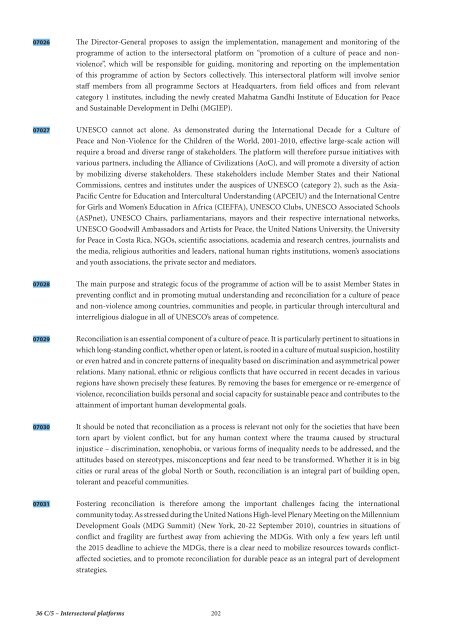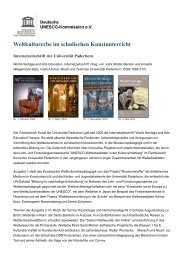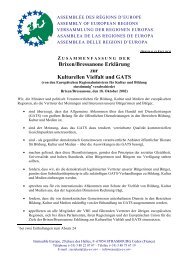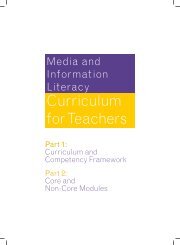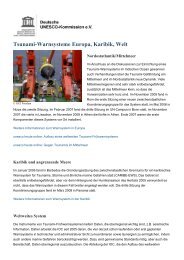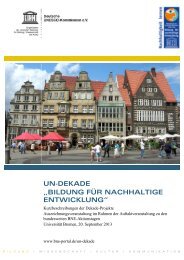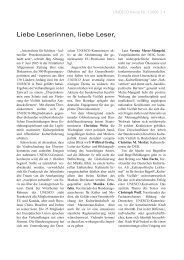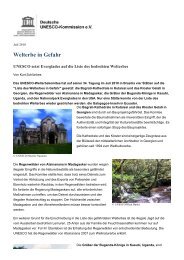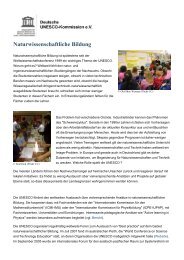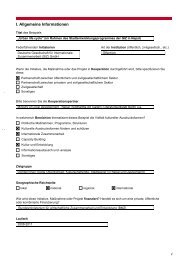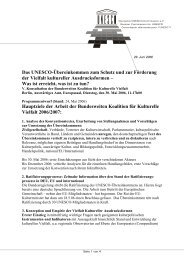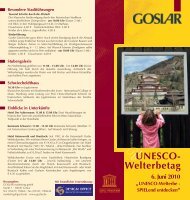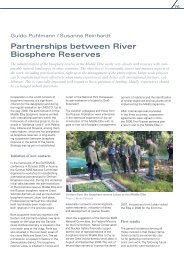UNESCO. General Conference; 36th; 36 C/5: volume 1: Draft ...
UNESCO. General Conference; 36th; 36 C/5: volume 1: Draft ...
UNESCO. General Conference; 36th; 36 C/5: volume 1: Draft ...
You also want an ePaper? Increase the reach of your titles
YUMPU automatically turns print PDFs into web optimized ePapers that Google loves.
07026 The Director-<strong>General</strong> proposes to assign the implementation, management and monitoring of the<br />
programme of action to the intersectoral platform on “promotion of a culture of peace and nonviolence”,<br />
which will be responsible for guiding, monitoring and reporting on the implementation<br />
of this programme of action by Sectors collectively. This intersectoral platform will involve senior<br />
staff members from all programme Sectors at Headquarters, from field offices and from relevant<br />
category 1 institutes, including the newly created Mahatma Gandhi Institute of Education for Peace<br />
and Sustainable Development in Delhi (MGIEP).<br />
07027 <strong>UNESCO</strong> cannot act alone. As demonstrated during the International Decade for a Culture of<br />
Peace and Non-Violence for the Children of the World, 2001-2010, effective large-scale action will<br />
require a broad and diverse range of stakeholders. The platform will therefore pursue initiatives with<br />
various partners, including the Alliance of Civilizations (AoC), and will promote a diversity of action<br />
by mobilizing diverse stakeholders. These stakeholders include Member States and their National<br />
Commissions, centres and institutes under the auspices of <strong>UNESCO</strong> (category 2), such as the Asia-<br />
Pacific Centre for Education and Intercultural Understanding (APCEIU) and the International Centre<br />
for Girls and Women’s Education in Africa (CIEFFA), <strong>UNESCO</strong> Clubs, <strong>UNESCO</strong> Associated Schools<br />
(ASPnet), <strong>UNESCO</strong> Chairs, parliamentarians, mayors and their respective international networks,<br />
<strong>UNESCO</strong> Goodwill Ambassadors and Artists for Peace, the United Nations University, the University<br />
for Peace in Costa Rica, NGOs, scientific associations, academia and research centres, journalists and<br />
the media, religious authorities and leaders, national human rights institutions, women’s associations<br />
and youth associations, the private sector and mediators.<br />
07028 The main purpose and strategic focus of the programme of action will be to assist Member States in<br />
preventing conflict and in promoting mutual understanding and reconciliation for a culture of peace<br />
and non-violence among countries, communities and people, in particular through intercultural and<br />
interreligious dialogue in all of <strong>UNESCO</strong>’s areas of competence.<br />
07029 Reconciliation is an essential component of a culture of peace. It is particularly pertinent to situations in<br />
which long-standing conflict, whether open or latent, is rooted in a culture of mutual suspicion, hostility<br />
or even hatred and in concrete patterns of inequality based on discrimination and asymmetrical power<br />
relations. Many national, ethnic or religious conflicts that have occurred in recent decades in various<br />
regions have shown precisely these features. By removing the bases for emergence or re-emergence of<br />
violence, reconciliation builds personal and social capacity for sustainable peace and contributes to the<br />
attainment of important human developmental goals.<br />
07030 It should be noted that reconciliation as a process is relevant not only for the societies that have been<br />
torn apart by violent conflict, but for any human context where the trauma caused by structural<br />
injustice – discrimination, xenophobia, or various forms of inequality needs to be addressed, and the<br />
attitudes based on stereotypes, misconceptions and fear need to be transformed. Whether it is in big<br />
cities or rural areas of the global North or South, reconciliation is an integral part of building open,<br />
tolerant and peaceful communities.<br />
07031 Fostering reconciliation is therefore among the important challenges facing the international<br />
community today. As stressed during the United Nations High-level Plenary Meeting on the Millennium<br />
Development Goals (MDG Summit) (New York, 20-22 September 2010), countries in situations of<br />
conflict and fragility are furthest away from achieving the MDGs. With only a few years left until<br />
the 2015 deadline to achieve the MDGs, there is a clear need to mobilize resources towards conflictaffected<br />
societies, and to promote reconciliation for durable peace as an integral part of development<br />
strategies.<br />
<strong>36</strong> C/5 – Intersectoral platforms 202


